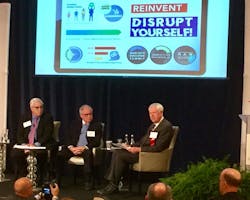2019 NAW Executive Summit Challenges Distributors to Embrace Creative Disruption
NAW’s 2019 Executive Summit in Washington, DC, attracted executives from several dozen different business niches within the wholesale-distribution industry to learn about new best practices from outside their business specialty and to get an update on the latest legislative challenges on Capitol Hill.
The program at the National Association of Wholesale-Distributors’ annual summit on Jan 29-31 offered several interesting panel discussions. Jia Wang, a professor at Texas A&M University was the moderator for “Maximize Your People Value Using the Head-Hand-Heart Factor,” a discussion on strategies to retain and mentor talent.
Matt Holt, VP of human resources, Dot Foods; Kari Heerdt, senior VP of human resources, MSC Industrial Supply; and Sean Schubert, VP, vertical niche strategies, Arthur J. Gallagher & Co.; discussed various strategies for maximizing the mentoring capabilities of senior employees nearing retirement. Heerdt said MSC often offers those employees the option of “retiring slowly” by letting them work part time before going into full retirement so they can train employees taking over their responsibilities.
In another panel, several of NAW’s Institute for Distribution Excellence Fellows engaged in a lively discussion on strategies distributors could use to compete against Amazon. Mark Dancer, president, Network for Channel Innovation; Brent Grover, managing director, Brent Grover & Co.; and Michael Marks, managing director, Indian River Consulting Group; said that while distributors should learn what they can from Amazon and other online merchants about doing business digitally, they should not underestimate their inherent advantages Amazon and these companies can’t match, including knowledgeable salespeople and deep customers relationships.
Michael Marks offered attendees an interesting idea on how they can identify potential competive threats. He suggested putting together several teams of employees and giving them a specified amount of “play money,” perhaps several million dollars, to create an imaginary company that identifies their own company’s weaknesses and develops strategies to compete with them.
One of the highlights of any NAW Executive Summit is Jade West’s report on the legislative progress on Capitol Hill. West, NAW’s senior VP for government relations, was a senior Republican aide on Capitol Hill for decades before joining NAW in 2002. She said that while the recent government shutdown was a disaster for the Republican party, it wasn’t good for the Democrats, either.
She believes both parties, “are in trouble at the national level,” adding that while the Democrats made gains in the mid-term elections and the “old guard” is still running things, the Democratic Party is taking a dramatic shift to the left. West said mainstream Republicans experienced a similar dramatic shift to more extreme positions several years ago when the Tea Party started driving policy debates toward their views.
West said one of the biggest future challenges for the Republican Party will be its messaging going into the 2020 Election, President Trump is currently still setting the agenda for the Republicans, she said.
Following the Executive Summit’s theme of “Disrupt Yourself,” Alan Amling, VP of UPS Ventures, gave a thought-provoking presentation on how UPS is looking for ways to build out from its core competencies in delivery and logistics. In his presentation, “The Disruptive Potential of 3D Printing,” he told attendees about UPS’ move into 3D printing through its partnership with Fast Radius, a provider of 3D printing services. Manufacturers place short-run orders with UPS/Fast Radius to print parts. UPS then delivers them through its global delivery network.
The 2016 press release announcing the partnership said, “UPS will launch a distributed, on-demand manufacturing network that links its global logistics network with 3D printers at The UPS Store in more than 60 locations around the United States and Fast Radius’ On Demand Production Platform and 3D printing factory in Louisville, KY.
“The integration into one additive manufacturing and logistics solution this summer will make 3D printing accessible to more potential users, enabling them to realize the convenience and cost-savings this technology offers.”
